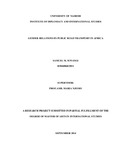| dc.description.abstract | SAMUEL M. MWANGI
The entrepreneurial participation of women in the motorized transport sector in many
African countries is limited. Determining the causal factors for the low participation of
women in the sector has been the main objective of the current study. Gender-based
challenges experienced by women in public road transport have also been looked into.
Interventions that have been put into place internationally to mitigate harassment of
women in public road transport have also been analyzed. The structural feminist theory
was utilized for the analysis. The theory focuses on social structures, notably patriarchy
and capitalism that oppress women. The study adopts the research design of a survey.
Surveys are concerned with describing, recording, analyzing and interpreting conditions
that either exist or existed. The researcher does not manipulate the variable or arrange for
events to happen. Surveys are only concerned with conditions or relationships as they
exist, opinions as they are held, processes as they are going on, effects as they are evident
and trends as they develop. Three factors were found to cause the low participation of
women in the IMT sector in Africa. They include historical reasons like colonialism,
violence, and the sexual division of labour. A survey of gender relations in the public
road transport in Nairobi, Kenya, was conducted. The study involved owners and workers
from 10 matatu SACCOs in Nairobi. The study also sought the views of 30 female and
30 male commuters on gender based harassment in public transport in Nairobi. It was
found that women workers comprise of about 4.95% of the workers in the sector. The
average matatu ownership for the SACCOs sampled was found to be 1.99 matatus per
member. However, a great difference emerges when one considers the ownership by male
and female owners separately. Ownership ratio for male owners was found to be 2.096
while that of female owners was found to be 1.33. It was found that 73.1% of the matatu
owners interviewed had worked in the matatu sector before in the positions of driver, or
as conductors. This implies that by excluding women from working in the motorized
public transport sector, women are, by extension disadvantaged with regard to ownership
of property. Transport owners and workers were found to comprise powerful political
lobbies in Kenya, Uganda, Nigeria and Ghana. Hence, the exclusion of women from
participating in the transport sector disenfranchises women from the political and
administrative opportunities associated with the field. The study found various gender
differentials in the attitudes of men and women towards the matatu, suggesting that
women’s travel needs are different form those of men and are hardly addressed in the
male-dominated sector. A study of expressions of masculinity in the public transport
sector in Africa is recommended. | en_US |

